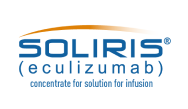


healthcare professional

No cases of meningococcal infection were reported in PREVENT, and the most common adverse reaction was headache (which occurred mostly in the initial phase of dosing).1-3
SOLIRIS® safety data extends through 31 completed clinical studies that included 1,503 patients exposed to SOLIRIS® in complement-mediated disease populations including paroxysmal nocturnal haemoglobinuria (PNH), atypical haemolytic uremic syndrome (aHUS), refractory generalised myasthenia gravis (gMG), and anti-aquaporin 4 antibody-positive neuromyelitis optica spectrum disorder (NMOSD).1
Due to its mechanism of action, SOLIRIS® increases the patient’s susceptibility to meningococcal infection
(Neisseria meningitidis). Meningococcal disease due to any serogroup may occur.1
Treatment considerations for SOLIRIS® patients:1
Treatment considerations for SOLIRIS® patients:1
- Cases of serious or fatal meningococcal infections have been reported in SOLIRIS®-treated patients1
- Vaccination may not be sufficient to prevent meningococcal infection. Consideration should be given to official guidance on the appropriate use of antibacterial agents1
- Sepsis is a common presentation of meningococcal infections in patients treated with SOLIRIS®1
- All patients should be monitored for early signs of meningococcal infection, evaluated immediately if infection is suspected, and treated with appropriate antibiotics if necessary. Patients should be informed of these signs and symptoms and understand that they must seek medical care immediately1

Healthcare professionals are asked to report any suspected adverse reactions. Please report any adverse reactions via your national reporting system. Adverse events should also be reported to Alexion pharmaceuticals by the following email:
https://contactazmedical.astrazeneca.com/
